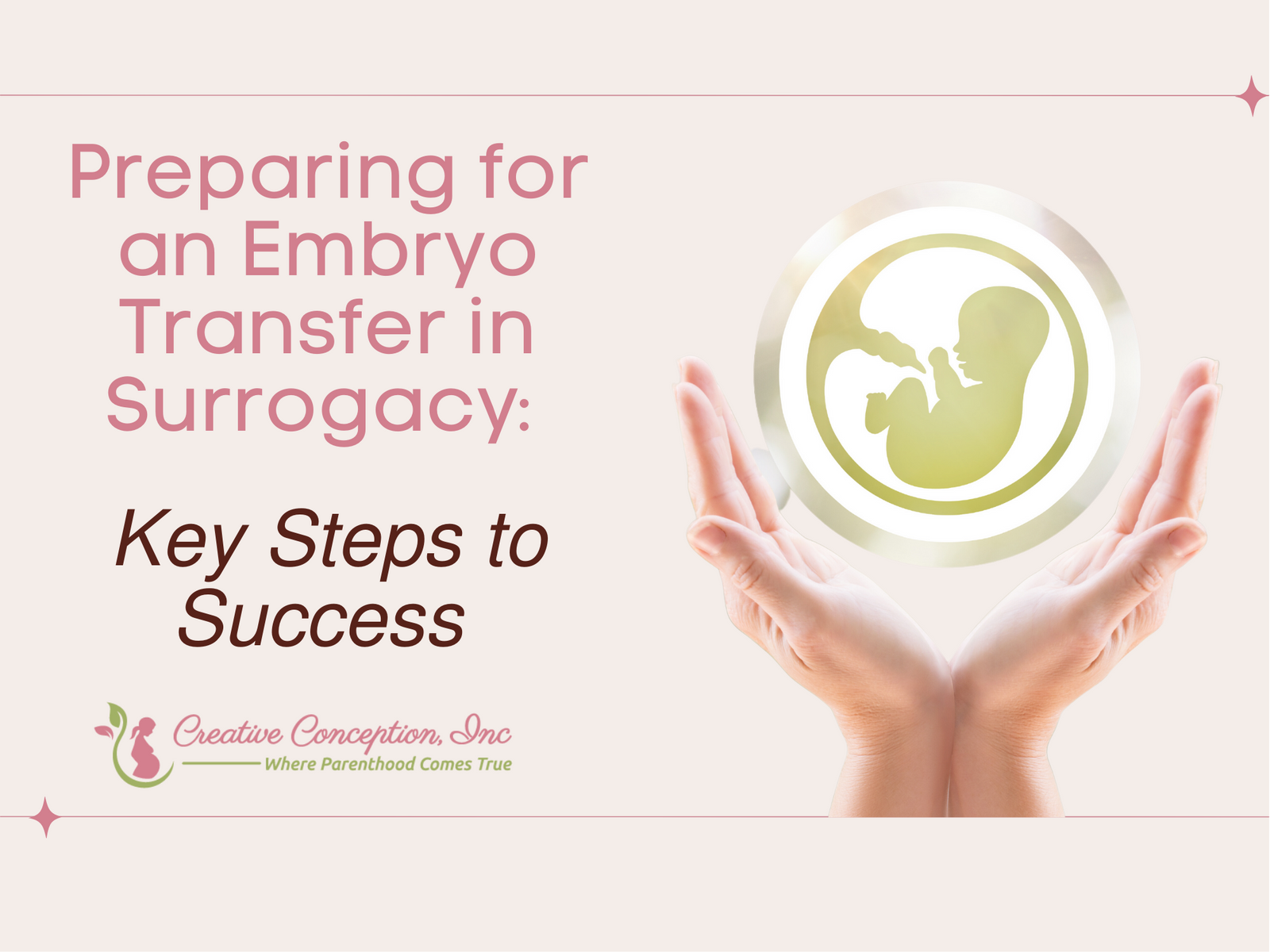Embryo transfer is a significant milestone in a surrogacy journey because it determines whether a positive pregnancy is achieved. As a surrogate, careful preparation is essential to maximize the chances of a successful transfer. In this blog, we will provide key steps on how to prepare for an embryo transfer in surrogacy, ensuring a smooth and successful process.

Preparing for an Embryo Transfer in Surrogacy: Key Steps to Success

1. Open Communication and Collaboration:
Establish open and clear communication with your Intended Parents, your surrogacy agency, and the fertility clinic. This ensures everyone is well-informed and on the same page throughout the process.

2. Follow Medical Protocols and Instructions:
- Attend medical appointments: attend all necessary medical appointments and follow the instructions/protocol provided by the fertility clinic. This may include diagnostic testing, hormone medication protocols, and uterine preparation.
- Medication Adherence: Strictly adhere to the medications prescribed by the fertility clinic. These may include hormone injections, taking oral medications and/or other supplements. Timely and accurate administration is crucial for a successful transfer.
- Pre-Procedure Instructions: Follow any specific guidelines the fertility clinic provides leading up to the embryo transfer. This may include fasting requirements, medication schedules, or other necessary preparations. Also, remember to bring your lucky socks!

3. Check with your IVF Center for Logistical Details:
To ensure a smooth and well-prepared embryo transfer, it is crucial to check with your IVF center well in advance regarding the logistical details for the day of the procedure. Here are a few important points to consider:
Arrival Time: Confirm the exact time you are expected to arrive at the clinic on the day of the embryo transfer.
Support Person: Inquire about the policy regarding bringing a support person to the procedure. Many IVF centers allow a companion to be present during the embryo transfer.
Required Documentation: Check for any specific documents or forms you need to bring with you on the day of the transfer.
Inquire about the estimated duration of your clinic visit before your visit.

4. Lifestyle Modifications:
- Healthy Habits: Adopt a healthy lifestyle by consuming a nutritious diet, exercising regularly and getting sufficient rest and plenty of sleep. Prioritize whole foods, stay hydrated, and avoid smoking, alcohol consumption, and taking any recreational drugs that could negatively impact the transfer process.
- Stress Management: Implement stress-reducing techniques such as meditation, deep breathing exercises, or engaging in activities that bring relaxation. Manage stress levels effectively to support a favorable environment for embryo transfer.

5. Emotional Support and Well-being:
- Surrogate Support Network: Seek support from your agency, support groups, or online communities where you can connect with other surrogates who have gone through similar experiences. Utilize your support to share your concerns, challenges, and joys to alleviate any emotional stress.
- Self-Care: Prioritize self-care activities that promote relaxation and emotional well-being. Engage in activities you enjoy, such as reading, exercising, or spending time with loved ones. Take time for yourself to recharge and nurture your emotional health.
CHOOSE CREATIVE CONCEPTION TODAY
Preparing for embryo transfer in surrogacy requires effective communication, adherence to medical protocols, lifestyle modifications, and emotional support. By following the guidance of the fertility clinic, maintaining a healthy lifestyle, managing stress levels, and nurturing your emotional well-being, you can create an optimal environment for successful embryo implantation. Embrace the journey with compassion, dedication, and open communication to enhance the chances of a positive outcome for all parties involved.
